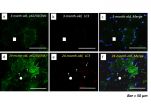Genomic testing can help identify patients at heightened risk for esophageal cancer
Endoscopic samples show precancerous genomic changes in Barrett's esophagus, according to report in the Journal of Molecular Diagnostics
2015-06-08
(Press-News.org) Philadelphia, PA, June 8, 2015 - Barrett's esophagus (BE) develops in a subset of patients with gastroesophageal reflux disease (GERD) and can increase the risk of developing cancer of the esophagus. Although periodic surveillance for cancer is recommended for BE patients, these examinations may fail to identify pre-cancerous dysplasia and early cancers. A report in the Journal of Molecular Diagnostics describes a test using next-generation sequencing (NGS) to detect genomic mutations in precancerous esophageal tissue, which may improve cancer surveillance and early detection in patients with BE.
"BE results from injury of the esophageal mucosa associated with gastroesophageal reflux, which leads to inflammation (esophagitis) and eventually BE," explained Antonia R. Sepulveda, MD, PhD, Professor of Pathology and Cell Biology, Vice Chair for Translational Research, and Director of the Division of Gastrointestinal Pathology at Columbia University College of Physicians and Surgeons, New York, NY. In the normal esophagus, the tissue lining is made of flat squamous cells that appear pearly white and smooth during endoscopy. In patients with BE, the cells lining the esophagus appear more like cells characteristic of the small intestine (known as specialized intestinal metaplasia). As BE progresses, cells may become more disordered and disorganized, sequentially changing to low-grade dysplasia, high-grade dysplasia (HGD), and eventually esophageal adenocarcinoma (EAC).
Pathology evaluation of biopsy samples is the gold standard for detection of dysplasia in BE. Molecular testing of BE has not entered clinical practice in part due to limitations of molecular testing methods requiring fresh or frozen tissue samples and lack of sensitivity to detect low-level mutations in precancerous samples.
Dr. Sepulveda and colleagues tested readily-available formalin-fixed, paraffin-embedded (FFPE) tissue taken from esophageal biopsies or endoscopic mucosal resections. Using NGS methods, the researchers analyzed FFPE tissue samples from 13 "non-progressors" (patients with BE who never manifested dysplasia or EAC during at least two years of monitoring), 15 "progressors" (patients who developed HGD or EAC), and control samples showing no evidence of Barrett's intestinal metaplasia. The researchers found that progressors had mutations in 75% (6/8) of cases compared to 0% in non-progressors. The tumor suppressor TP53 was the most commonly mutated gene in the BE progressor group. Mutations were also found in the APC and CDKN2A tumor suppressor genes.
"The ability to detect mutations in non-neoplastic mucosa, quantitatively and with high detection sensitivity, makes it possible to use NGS mutational testing in the early detection and surveillance of patients who develop BE," noted Dr. Sepulveda.
BE is considered one of the most significant risk factors for EAC. Compared with the general population, patients with BE have more than an 11-fold increased risk for EAC. Although EAC is a relatively rare cancer, it is the tenth leading cause of cancer death in the United States. Between 2005 and 2011, about 18% of EAC patients survived for five years. However, because earlier cancer detection is associated with longer survival, there is a great need for detecting cancer early and finding biomarkers that can help predict patients at greatest risk.
INFORMATION:
ELSE PRESS RELEASES FROM THIS DATE:
2015-06-08
Just one in 20 people worldwide (4·3%) had no health problems in 2013, with a third of the world's population (2·3 billion individuals) experiencing more than five ailments, according to a major new analysis from the Global Burden of Disease Study (GBD) 2013, published in The Lancet.
Moreover, the research shows that, worldwide, the proportion of lost years of healthy life (disability-adjusted life years; DALYS [1]) due to illness (rather than death) rose from around a fifth (21%) in 1990 to almost a third (31%) in 2013.
As the world's population grows, ...
2015-06-08
Sarcopenia is the aging-related loss of skeletal muscle mass and strength. Preventing sarcopenia is important for maintaining a high quality of life (QOL) in the aged population. However, the molecular mechanism of sarcopenia has not yet been unraveled and is still a matter of debate.
Determining whether the levels of autophagy-related mediators (e.g., p62/SQSTM1, LC3, etc.) in muscle change with ageing is important to understanding sarcopenia. Such information could enhance the therapeutic strategies for attenuating mammalian sarcopenia.
In previous studies, autophagic ...
2015-06-08
Debates about legalizing marijuana have focused on crime rates, economic benefits, and health effects among adults. But a study published today from researchers at Nationwide Children's Hospital shows that the risk to young children of swallowing, breathing in or otherwise being exposed to marijuana also needs to be considered.
The study, published online today in Clinical Pediatrics, found that the rate of marijuana exposure among children 5 years of age and younger rose 147.5 percent from 2006 through 2013 across the United States. The rate increased almost 610 percent ...
2015-06-08
SEATTLE -- People across the world are living longer but spending more time in ill health as rates of nonfatal diseases and injuries - including diabetes and hearing loss - decline more slowly than death rates, according to a new analysis of 301 diseases and injuries in 188 countries.
Using a measurement known as years lived with disability, or YLDs, researchers from around the world quantified the impact of health problems that impair mobility, hearing, or vision, or cause pain in some way but aren't fatal. In 2013, low back pain and major depressive disorder were among ...
2015-06-08
Clermont, Florida. (June 8, 2015) - A new national survey about men and their cars, commissioned by Orlando Health, found that more than 80 percent of men could remember the make and model of their first car, but only about half could remember the last time they went to the doctor for a check-up.
The survey of approximately 1,000 men is being released in conjunction with the start of the Drive For Men's Health, a cross-country event where two of the top men's health surgeons in the US will travel 6,008 miles to promote awareness on various men's health topics. ...
2015-06-08
Cancer cells share certain traits with anti-social members of human society. They shirk community responsibilities and engage in behavior aimed at fulfilling their selfish needs at the expense of the greater good.
In a new study, Athena Aktipis, a researcher at Arizona State University's Biodesign Institute, along with her international colleagues, explore the ways in which cancers bypass the protective mechanisms used by multicellular forms to ensure their survival and wellbeing.
The paper identifies five foundations of multicellularity; maintenance factors present ...
2015-06-08
The study, by engineers at the University of Sheffield, is the first to prove conclusively that contaminants can enter pipes through leaks and be transported through the pipe network.
The pressure in mains water pipes usually forces water out through leaks, preventing anything else from getting in. But when there is a significant pressure drop in a damaged section of pipe, water surrounding the pipe can be sucked in through the hole.
It had been assumed that only clean water from the leak would be sucked in, and that even if contaminants were sucked in these would ...
2015-06-08
Glasgow, United Kingdom: The largest study to date of attitudes towards the use of genomic information shows that the majority of people want access to results from genome sequencing, even if these are not directly related to the condition for which the analysis has been undertaken. This applies even when the data are not health-related or are simply 'raw', a researcher will tell the annual conference of the European Society of Human Genetics today (Monday).
Dr Anna Middleton, a Principal Staff Scientist at the Wellcome Trust Sanger Institute, Cambridge, UK, will describe ...
2015-06-08
Research published today in the journal the International Journal of Life Cycle Assessment has called for an overhaul of the way mobile devices are manufactured and contracted, in order to stop the harmful effects on the environment caused by current business models.
Researchers from the University of Surrey analysed studies on the lifespan of mobile devices, from manufacture, use and disposal to see what impact each stage had on the environment. Through their investigation, they concluded that the current mobile business model, driven by frequent upgrades, is costing ...
2015-06-07
A phase II clinical trial testing the ability of the generic vaccine bacillus Calmette-Guérin (BCG) to reverse advanced type 1 diabetes has received approval from the U.S. Food and Drug Administration (FDA). The approval of this trial, which will shortly begin enrolling qualified patients, was announced today at the 75th Scientific Sessions of the American Diabetes Association (ADA) by Denise Faustman, MD, PhD, director of the Massachusetts General Hospital (MGH) Immunobiology Laboratory and principal investigator of the study.
The five-year trial will investigate ...
LAST 30 PRESS RELEASES:
[Press-News.org] Genomic testing can help identify patients at heightened risk for esophageal cancer
Endoscopic samples show precancerous genomic changes in Barrett's esophagus, according to report in the Journal of Molecular Diagnostics


